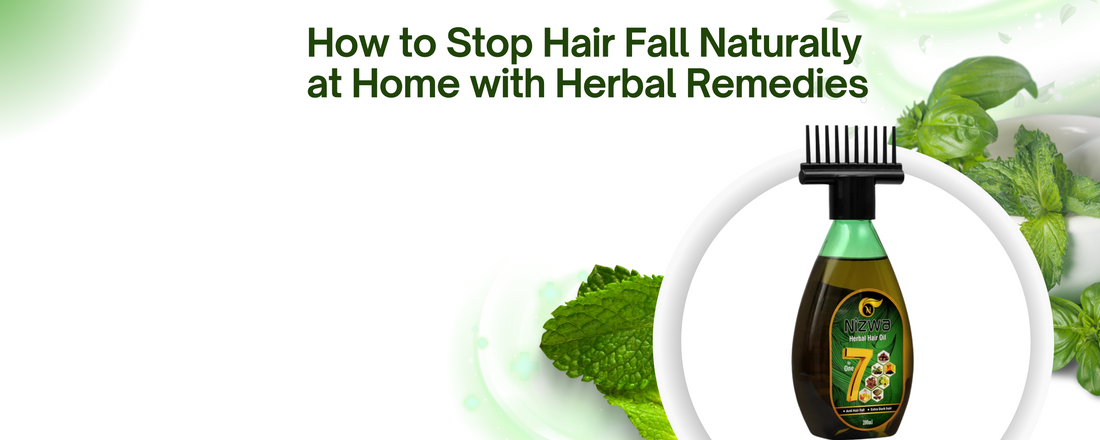
How to Stop Hair Fall Naturally at Home with Herbal Remedies
Hair fall is a common concern affecting both men and women, often leading to stress and lowered confidence. If you’re noticing more strands in your comb or shower drain, don’t panic—natural herbal remedies can offer a safe, chemical-free way to restore hair health and encourage regrowth.
But first, it’s important to understand why your hair is falling. Common causes include stress, poor diet, hormonal imbalances, or underlying medical issues. Identifying the root cause can make any treatment—especially herbal—far more effective.
Common Causes of Hair Fall
Hair fall isn’t the same for everyone. It could be genetic or linked to nutritional deficiencies such as iron, vitamin D, or biotin. Hormonal disorders like thyroid imbalance or PCOS are major contributors, while ongoing stress and lack of sleep affect blood circulation to the scalp. In some cases, medical issues like scalp infections or alopecia play a role.
Types of Hair Loss
Knowing the type of hair fall helps tailor the right remedy:
- Telogen Effluvium: Sudden hair shedding, often stress-related
- Androgenetic Alopecia: Gradual, hereditary thinning
- Alopecia Areata: Patchy loss due to immune issues
- Traction Alopecia: Due to tight hairstyles or frequent styling
Top Herbal Remedies for Hair Growth
Herbs have long been used to promote hair growth naturally. Here are some trusted options:
- Aloe Vera: Soothes the scalp and unclogs follicles. Apply pure aloe gel or mix it with essential oils.
- Bhringraj, Amla, Brahmi: Ayurvedic herbs known to nourish roots, improve keratin production, and increase scalp blood flow.
- Fenugreek (Methi): High in protein and nicotinic acid; soak overnight, grind to a paste, and apply.
- Hibiscus: Conditions hair and supports growth. Use in paste or oil form.
Easy Herbal Preparations at Home
- Herbal Coconut Oil: Infuse coconut oil with dried Bhringraj or Hibiscus for a powerful scalp massage oil.
- Onion Juice Mix: Combine onion juice with herbal oil to stimulate follicles.
- DIY Herbal Mask: Blend Reetha, Shikakai, and a few drops of essential oil for a cleansing and strengthening hair mask.
Traditional Recipes That Still Work
- Herbal Rinse: Boil neem leaves, tulsi, and lemon. Use as a final rinse after washing your hair.
- Herbal Serum: Mix rosemary, peppermint, and tea tree oils with almond or coconut oil to create a daily serum that boosts scalp circulation.
Diet & Lifestyle Matter Too
A healthy diet rich in iron, biotin, zinc, and vitamins supports internal hair health. Include eggs, spinach, nuts, and carrots in your meals. Herbal teas like rosemary or peppermint may also help. Avoid sulfates in shampoos, limit heat styling, and practice stress relief techniques like yoga or meditation.
Conclusion
Natural herbal remedies, when combined with good nutrition and mindful living, provide a gentle yet effective way to combat hair fall. Be patient—results take time. But with consistent care, you’ll not only protect your hair but also improve your overall well-being.
Start today—and let nature work its magic for stronger, healthier hair.
Frequently Asked Questions (FAQs)
1. What is the main reason for hair fall?
Hair fall can be caused by various factors including stress, poor diet, hormonal imbalances (like thyroid issues or PCOS), nutritional deficiencies, or genetics. Identifying the root cause helps in selecting the right treatment.
2. Which herbs are best for stopping hair fall?
Top herbal remedies include Aloe Vera, Bhringraj, Amla, Brahmi, Fenugreek (Methi), and Hibiscus. These herbs promote scalp health, improve circulation, and strengthen hair roots naturally.
3. Can diet affect hair fall?
Yes. A diet rich in biotin, iron, zinc, and vitamins A, C, and D supports healthy hair. Include foods like eggs, spinach, carrots, and nuts, and drink herbal teas to improve scalp health.
4. How long do herbal remedies take to show results?
Herbal remedies typically take 4 to 8 weeks of consistent use to show visible improvement. Patience and consistency are key when using natural treatments.
5. When should I see a doctor for hair fall?
If your hair loss is excessive, patchy, or doesn't improve with natural remedies, it's best to consult a dermatologist or trichologist for proper diagnosis and medical guidance.


